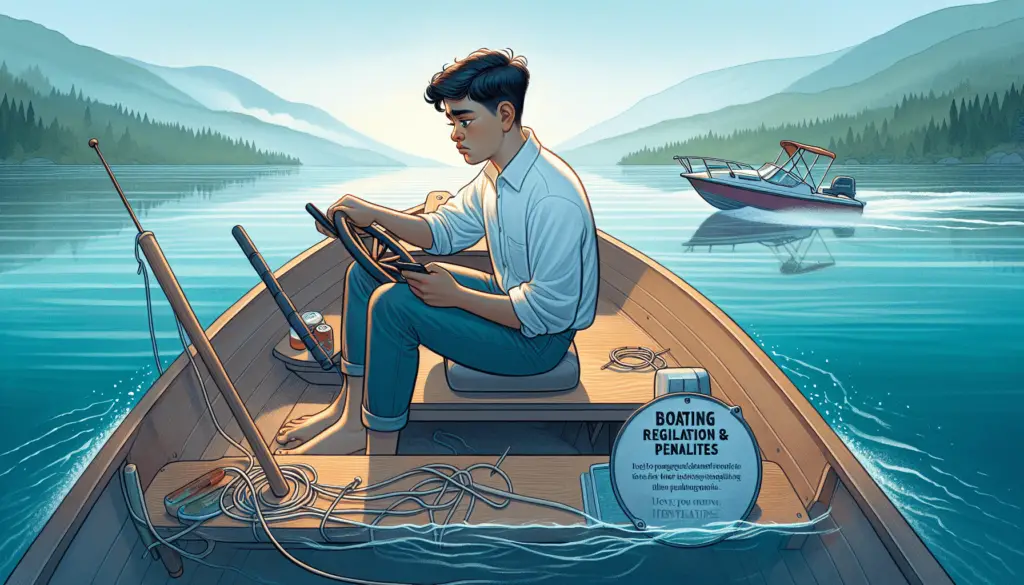Sailing on the open seas, commanding your own vessel and feeling the spray of the ocean can be an exhilarating experience, and it is no wonder that boating captures the fascination of young minds. However, there’s also a vital aspect you need to consider- the law. “Boating Underage: Regulations and Penalties” guides you through the complex labyrinth of rules related to underage boating, touching upon the strict regulations and severe penalties you face if you tend to take a rogue wave. Your voyage into a deeper understanding of maritime law begins here.
Understanding Underage Boating
Underage boating entails all the fun, excitement, and adventure as regular boating, just encompassing a younger group of enthusiasts. These are individuals under the age of adulthood, defined by the boating regulations of their specific jurisdictions, who take up the opportunity to engage with open waters either for leisure or sporting activities.
Defining ‘underage’ in boating
The label ‘underage’ in boating is primarily falling for individuals who haven’t reached the adults’ defined age limit in their respective location or jurisdiction. Depending on various countries and regions, the demarcation for underage can differ significantly, with some setting it as low as 12 years, while others may have it up to 16 or 18 years.
Common instances of underage boating
Your mind might dance to imaginings of little sailors clad in life jackets, steering their vessels across the water. However, the reality of underage boating lies somewhere from scampering on the beach, playing with their toy boats, to teenagers commandeering a motorboat across a lake. It’s a common sight during vacations in coastal areas, youth camps near water bodies, or annual family outings to a luminous lake.
Regulations Governing Underage Boating
Various regulations are specially designed to ensure that underage boating is well-governed, safe, and well within the boundaries of the law.
International conventions on underage boating
Internationally, organizations such as the International Maritime Organization (IMO) provide guidelines for the safety and security of boating, including those for under-age boaters. Although there are no fixed global standards for the minimum age for boating, conventions established by these bodies aim to foster safe practices across different nations.
Domestic law on underage boating
At the national level, each country has specific regulations governing underage boating. These range from the minimum age for operating various types of watercraft to the stipulations for obtaining boating licenses.
Role of the Coast Guard and other authorities
Authorities such as the Coast Guard, Harbor Police and Department of Natural Resources play a crucial role in monitoring and enforcing the rules and regulations associated with underage boating. They ensure that young mariners adhere to safety protocols and wear appropriate safety gear.

State-Level Regulations
Laws and regulations concerning underage boating fluctuate greatly from one state to another, given the variations in water bodies, climates, and local conditions.
Variances in underage boating laws by state
Depending on the state, the age prerequisite for operating a boat or personal watercraft may range from 12 to 16 years. Some states require the boater to have a boating safety certificate or to be supervised by an adult.
State guidelines for underage boaters
In addition to the varying regulations, states usually provide a set of safety guidelines specifically tailored for young boaters. These can cover a range of topics from operating parameters to safety equipment requirements.
Licensing Requirements for Underage Boaters
Much like driving a car, operating a boat requires delineated training and a particular license, which holds even for underage boaters.
Eligibility for obtaining a boating license
The eligibility to obtain a boating license for minors depends on the laws of the jurisdiction. Some states consider factors like the age of the minor and the type of watercraft they intend to operate.
Procedure to acquire a boating license for minors
Acquiring a boating license generally involves taking a boating safety course followed by a test. On successfully passing the test, the junior boater receives a boating license or certificate.
Importance of boating education courses
boating education courses serve as the foundation for learning and comprehension of boating laws, rules of navigation, and emergency procedures. Not only do they provide young boaters with essential technical skills, but they also instill in them an appreciation for the significance of safety precautions.

Safety Considerations and Guidelines
Boating safety is paramount, especially when dealing with underage boaters whose experience and judgment might be limited compared to adults.
Importance of safety equipment
From life jackets to emergency signal devices, safety equipment serves as a vital line of defense against accidents while boating. Particularly for underage boaters, it is essential to always be equipped with appropriate safety gear.
Guidelines for operating a boat safely as a minor
Certain guidelines help minors navigate safely. Understanding weather forecasts, maintaining a safe speed, keeping a close watch on the surroundings, and abstaining from boating under the influence of alcohol or drugs are few important points a minor should keep in mind.
Role of adult supervision in boating safety
The presence of an adult while boating adds an extra layer of safety. Their expertise and judgment come in handy in preventing mistakes or accidents and guiding the minor boater through difficult or unfamiliar situations.
Potential Risks and Dangers in Underage Boating
Despite all precautions and regulations, boating still carries potential risks, particularly for underage boaters.
Statistics on accidents involving underage boaters
While exact numbers may vary, there is no denying the existence of accidents involving underage boaters. These incidents often result from mistakes or lapses in following safety guidelines.
Potential hazards in boating and ways to mitigate them
Hazards can range from weather change, navigation complications, equipment failure to mere inexperience. Mitigation involves proper boating education, safety gear, adult supervision, and compliance with boating regulations.
Responsibilities and Duties of Underage Boaters
Boating is not just a fun activity but also a responsibility. Underage boaters carry numerous obligations to ensure the safety of themselves and others on the water.
Expected behavior and conduct
Boater etiquette falls among these responsibilities – respecting other mariners, avoiding environmentally sensitive areas, and following the “rules of the road” for waterways.
Understanding the importance of responsible boating
Grasping the essence of responsible boating helps mitigate risks, preserve the environment, and facilitates a wholesome boating experience for all.
Penalties for Underage Boating Violations
Violations of underage boating regulations can lead to severe penalties and legal consequences.
Common violations and their penalties
Typical underage boating violations might include boating without a license, operating a boat under the influence of alcohol or drugs, or operating a boat in a reckless manner. Penalties can range from fines and boating license suspension to potential imprisonment in severe cases.
Process of reporting violations
In case you observe a violation, you can report it to the appropriate authorities such as the Coast Guard or local Harbor Police. Details like the boat’s registration number, the time and location of the incident, and a description of the violation can hugely assist the investigation.
Legal implications and consequences
Apart from penalties, underage boating violations can also lead to legal implications, such as criminal charges or lawsuits. Therefore, it’s critical to understand and adhere to the boating rules and regulations in your area.
Preventing Underage Boating Violations
Although underage boating violations are severe, they are often preventable with the right approach and measures.
Role of boating safety education
Boating safety education is a crucial deterrent to violating guidelines. Knowledge and understanding of boating laws, safety protocols, and best practices greatly reduce the chances of committing a violation.
Importance of parental guidance and supervision
Parental guidance and supervision play an essential role in preventing boat mishaps. Parents’ knowledge and experience impart valuable lessons on safe and responsible boating to younger fans of the sport.
Effective prevention strategies
Effective prevention of underage boating violations combines several strategies – comprehensive boating education, strict adherence to safety protocols, involvement of adult supervision, and a culture of responsible and respectful boating.
Case Studies and Real-Life Scenarios
Learning from experiences, especially the mistakes of others, forms an essential part of comprehensive boating education.
Instances of underage boating violations and their consequences
Regrettably, there have been instances where underage individuals have operated boats recklessly or without proper certifications, leading to unfortunate and sometimes tragic consequences.
Lessons learned from these case studies
The lessons to learn from these case studies emphasize the importance of boating safety course certifications, the installation and use of appropriate safety gear such as life jackets, and the necessity of adult supervision for underage boaters. Each story reminds the reader that safety needs to be prioritized above all else when it comes to boating.
In conclusion, underage boating is a great way for younger individuals to enjoy water-related recreational activities. However, it is incumbent upon everyone to ensure that the rules and guidelines established for boating are strictly adhered to. This way, we can all contribute to ensuring the safety and well-being of our young boating enthusiasts.

